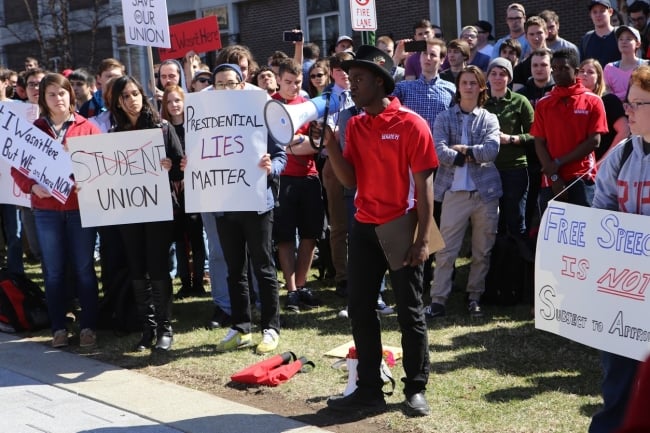You have /5 articles left.
Sign up for a free account or log in.

Protest at RPI
Andrew Armenia
William Puka spoke into a megaphone, surrounded by hundreds of cheering students holding picket signs.
“I just wanted to say,” he told the crowd, “that the class is going very well so far.”
It wasn’t technically a class, but at the same time, it had to be. Without the protections Puka had created by calling the gathering a class, hundreds of students could face the consequences of protesting without permission.
At Rensselaer Polytechnic Institute, where Puka is a professor, peaceful protests are allowed, as long as an application is submitted -- and approved -- at least seven days in advance.
The event’s primary organizers, Daniel Seel and Gregory Bartell, had made the deadline, but just barely. They planned to protest the decision during President Shirley Ann Jackson’s spring town hall meeting Wednesday, and they turned in their application eight days in advance.
But in a letter from the dean of students, they were told that their protest violated a student handbook rule: protests may not "disrupt the normal operation of the institute.” The protest, scheduled at the same time and place as Jackson’s town hall, could be disruptive, the letter said.
The students' frustrations started with the student union. Over spring break, students noticed a job posting for an executive director of student activities, a position that would oversee the student union. For most of the union’s history, students have had substantial control over the union, and they say the new position would weaken student autonomy.
“Situations like this can only occur when there’s miscommunication or no communication,” Seel said. “In this case, there was no communication.”
After the first denial, the students tried to negotiate. What if the protesters stayed within certain zones? What if they agreed beforehand whether they could stand on the grass or on the sidewalks?
“The request was summarily denied once again, for the same reasons,” Seel said.
That’s where Puka came in. He teaches ethics and democracy, and he felt he had to help. “I actually live my subject matter 24-7,” he said in an email.
When he heard that the students’ application had been rejected, he decided to hold his class outside, at the same time and place. Everyone would be invited, and the group would be discussing the same issues.
“The student peaceful-protest application was denied on grounds that it interfered with routine institute function and educational functions at the institute,” Puka said. “Holding a class is certainly the height of routine and educational function.”
By the time hundreds of students gathered Wednesday afternoon, it had become a free speech issue. Some students cite a culture of fear on campus, and some say they fear repercussions for speaking their mind.
For years, Jackson’s leadership has been controversial. Back in 2007, after a dispute, she suspended the Faculty Senate. The Foundation for Individual Rights in Education has given some of the university’s policies a red light rating.
From Bartell and Seel’s perspective, it seems that their peers view their decision to speak out as an outlandish decision. Bartell, who was on the student union’s executive board, resigned from his position Wednesday, saying that he doesn’t want to harm others in student government.
As planned, Jackson took questions at the town hall meeting Wednesday afternoon. She announced that she had suspended the job search temporarily, while the Board of Trustees reviews the union constitution.
“There is some disagreement regarding the degree of autonomy and the language of the union constitution,” she said. “There is no ambiguity with respect to the fact that the Board of Trustees has the ultimate responsibility for the union. I feel it's appropriate for the Board of Trustees to look at the union and decide what independence and autonomy mean.”
But Jackson said she doesn’t know why students claim there’s a culture of fear on campus, and that she respects the students’ right to protest peacefully.
“I could technically say that having this class turn into a protest -- I could say that they technically violated the university rules,” Jackson said. “But we’re not going to do anything about that.”








